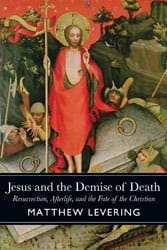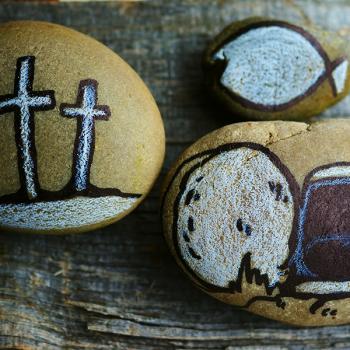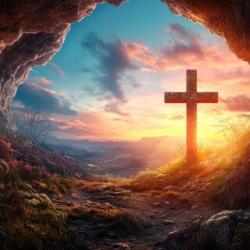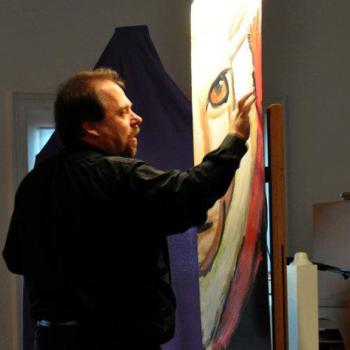Now Featured in the  Patheos Book Club
Patheos Book Club
Jesus and the Demise of Death
Resurrection, Afterlife, and the Fate of the Christian
By Matthew Levering
Book Excerpt: Introduction
The Plan of the Work
The eminent biblical scholar Richard B. Hays calls upon contemporary theologians to "press forward to a robust recovery of apocalyptic teaching and preaching."1 By "apocalyptic," he has in view the Church's traditional teaching about "the ultimate glorification of Jesus Christ as Lord over all creation, the resurrection of the body, God's final judgment of all humanity, and 'the life of the world to come' in true justice and peace."2 When it comes to theological discussion of these themes, however, the past century has been a tumultuous one. The Church's traditional eschatology has fallen out of favor.3 For many theologians and biblical scholars, significant portions of the Church's traditional eschatology reflect an outdated worldview.4
Taking up Hays' challenge, I seek to contribute to the "robust recovery of apocalyptic teaching and preaching" by setting forth a theology of resurrection and eternal life (Christ's and ours). By means of a constructive retrieval of Thomas Aquinas' theology of resurrection and eternal life, I argue that the Church's traditional eschatology has a biblical perspicacity that has been missed by its critics.5 Since we learn about resurrection and eternal life from Scripture, I also examine in some detail the
approaches of biblical scholars to these topics.6 This exegetical engagement provides the basis for appropriating Aquinas' theological insights in a contemporary fashion. In this regard I agree with Joseph Ratzinger that theological insights "must be capable of holding up in biblical terms, but it would be false to treat them as exegetical conclusions because the way we have decided in their favor is that appropriate to systematic thought."7 A Thomistic theology of resurrection and eternal life should accord with Scripture without claiming to derive "exegetical conclusions" in a strict sense.
In preparing this book, I was inspired by Alexander Schmemann's remark that "it is our whole faith that by His own death Christ changed the very nature of death, made it a passage--a 'passover,' a 'Pascha'--into the Kingdom of God."8 Since Jesus' redemptive death has enabled our death to be a "passage" into the kingdom of God, the book has two sections, one on Jesus' passage (his descent into hell, resurrection, and ascension), and one on the Church's passage.9 It may seem unusual that I do not include a chapter on the cross, given that eschatological communion with the Trinity is attained in and through Christ's cross.10 In this book, however, my fundamental concern is what happens after death to Jesus and to those who follow him,11 a concern that is inseparable, of course, from how the Church participates in Jesus' paschal mystery here and now.
The book's first section, comprising three chapters, explores Jesus Christ as the one "who discloses to us what 'existence in transition' means."12 Chapter 1 asks whether, in accord with the Apostles' Creed, contemporary Christians should affirm that Jesus descended into hell when he died, and if so, how to understand this affirmation. Agreeing with N. T. Wright that an intermediate state exists (after death but prior to resurrection), I argue that the dead Jesus joined the holy people who preceded him, and that his sojourning with them was a joyful one because he was present as the conqueror of sin. Chapter 2 treats Jesus' glorious resurrection from the dead "in accordance with the scriptures" of Israel (1 Cor 15:4). In light of the historical reflection on resurrection faith (Jewish and Christian) provided by Jon Levenson, N. T. Wright, Dale Allison, and James Dunn, I inquire into whether theology has anything to add, particularly as regards the relationship of Jesus' resurrection to Israel and the Church. Chapter 3 studies Jesus' ascension in his flesh to the right hand of the Father, from whence he pours forth the Holy Spirit, who "is love drawing us up to heavenly things."13 I seek to distinguish Jesus' humanity and divinity in the glorification of Jesus and in the sending of the Spirit, and I inquire into the meaning of the Father's "right hand." These chapters emphasize that at every step of Jesus' passage we are included: Jesus rejoices with the believing dead in the intermediate state; his glorious resurrection is in various ways the cause of ours; and his ascension to the right hand of the Father enables him to glorify us. As Douglas Farrow says, "our destiny is bound up with that of Jesus."14
The second section, on our passage, occupies the final four chapters. Chapter 4 examines the eschatological community that even now participates in Christ's resurrection and that awaits his return in glory and the consummation of history. Taking my bearings largely from the Book of Acts, I explore how faith, eucharistic worship, and charitable almsgiving relate us to Jesus. I ask whether Aquinas' portrait of these realities obscures the eschatological orientation that they have in the New Testament. The fifth and sixth chapters address topics that are fundamental for conceiving of the world to come in relation to this world: whether God enables our actions to merit eternal life, and whether God has created us with a spiritual soul. Lastly, chapter 7 asks how the life of the world to come-beatific vision, bodily resurrection, the new creation-fulfills the passage on which the church is already embarked (as sketched in chapter 4). I agree here with Richard Bauckham and Trevor Hart: "Humans have been created to find our eternal fulfilment and joy in the vision of God. Creatures can have no completion or perfection in themselves alone, and human creatures will find their faculties of love, knowledge and enjoyment of beauty fully satisfied only in relation to God."15 As Bauckham and Hart point out, the vision of God does not compete with our knowledge and love for creatures, as it would if God were a reality alongside creatures rather than the transcendent Creator in whom all creatures have their being. The portrait of our eternal life in the Trinity that I offer in this final chapter requires, in Hays' evocative phrase, "the conversion of the imagination."16




